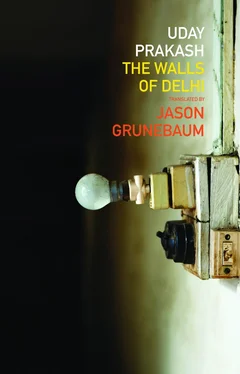Uday Prakash
The Walls of Delhi
This story’s really just a front for the secret I want to tell you — a secret hidden behind the story. Why? Well, what do you call what reaches your ears?
Rumours, rumours, disguised as facts, but nothing but rumours. That’s how things are, I’m afraid — like the appearance that I might disappear at any moment.
Gone in my very own time.
The paan shop leads to the opening of a tunnel full of the creatures of the city, and the tears and spit of a fakir.
Sanjay Chaurasia’s paan cart stood less than five hundred yards from my flat; Ratanlal sold chai right next to Sanjay’s. Sanjay had come to Delhi from a small village near Pratapgarh, and Ratanlal from Sasaram. Their makeshift shops were on wheels so they could make a quick getaway in case an official came nosing around. Cops on motorbike patrol came by all the time, but they got their weekly cut. Ratanlal paid five hundred, Sanjay seven. The two men didn’t worry.
‘What’s the big deal? I’ve got no problem. Say I did have a real place. I’d be paying the same money in rent anyway. Or more. Am I right? As long as a man is getting his daily bread, he can fight off the rabid dogs. When I’m right, I’m right,’ Sanjay Chaurasia said, smiling. I wondered whose life was more like the dogs’.
A few steps away was a third enterprise on wheels — the bicycle repair cart belonging to Madan Lal. And across the road from Madan Lal was Devi Deen, the shoe repairman, and just down the road from him was Santosh, a mechanic who fixed scooters, cars, and repaired flat tires. Santosh had come to Delhi four years ago, making his way from a village in Haryana, close to where Madan Lal and Devi Deen were from. All the vendors and hawkers set up camp wherever they could. As night fell, Brajinder joined them, pushing his fancy electric ice cream cart, ‘Kwality Ice Cream’ printed in rainbow letters on the plastic panels. So did Rajvati, who sold hard boiled eggs. Her husband, Gulshan, was there too, with their two kids. Behind her shop, four brick walls enclosed a little vacant lot. As night wore on, people pulled up in cars asking Gulshan for a little whisky or rum. The government liquor shops were long closed by that hour, so Gulshan would cycle off and return with a pint or a fifth he secured from one of his black market connections. Some customers wanted chicken tikka with their hard boiled eggs, which Gulshan would fetch from Sardar Satte Singh’s food stand up at the next set of lights. Sometimes, the customers would give him a little bit of whisky by way of a tip, or a few rupees. Rajvati didn’t make a fuss, since it was a hundred times better for her husband to drink that kind of whisky, and for free, than to spend his own money on little plastic pouches of local moonshine. You could count on that kind of hooch being mixed with stuff that might make you go blind, or kill you outright.
The rickshaw drivers also hung around. Most of them came from Bihar or Orissa, and stood wearily amid the bustle on the lookout for passengers. Tufail Ahmed had come from Nalanda with his sewing machine, which he plonked down right beside the brick enclosure. He did a little business for a short while. But since Tufail Ahmed didn’t have a fixed address, people were wary of leaving their clothes with him. So the only jobs he got were mending schoolchildren’s bookbags, or hemming workers’ uniforms, or patching up rickshaw drivers’ clothes. After a couple of weeks, he stopped showing up. One person said that he was sick, another said he went back to Nalanda, and still others said he’d been hit by a Blue Line bus. His sewing machine was tossed into the scrapheap behind the police station.
It was the same story with Natho and her husband, Mangé Ram, whose cart was right next to Rajvati and her eggs. They sold channa masala at night and chole kulche during the day: no one had seen them for a few months. Someone said that Mangé Ram came down with stomach cancer, and that Natho had drunk away the money for medicine; and, after Mangé Ram died, she took the two kids, crossed over to the other side of the Jamuna, and took up with someone else who had his own kulche cart.
That’s how it was around here, as if there was an unwritten law. Every day, one of these new arrivals would suddenly disappear, never to be seen again. Most of them didn’t have a permanent address where you could go to inquire after they were gone. Rajvati, for example, lived two miles from here, near the bypass, with her husband and two kids, in sixteenth century ruins. If you’ve ever been on the National Highway going toward Karnal or Amritser and happened to glance north, you’ll have seen the round building with a dome right beside the industrial drainage: a crumbling, dark-red brick ruin, with old worn stones. It’s hard to believe that humans could be living there. The famous bus named Goodwill that travels from India to Pakistan — from Delhi to Lahore — passes right by that part of the highway.
But people do live there — families, for the most part, and two single men: Rizwan, whose right leg and hand have wasted away from leprosy, and Snehi Ram, who is so old that he sleeps all day long under the neem tree growing next to the sewage runoff. Snehi Ram knows the entire Ramayana of Tulsidas and the Soor Sagar by heart, and people swoon when they hear his rendition of the Dhola Maru and other epic songs. The two men can count on food handouts from the families living in the ruins. Rizwan gets up first thing in the morning, heads toward the bypass, drinks his chai and eats his bun at Gopal Dhandhar’s, before installing himself at the bus depot until evening, begging. Rizwan’s beard is streaked with grey, his face reminds you of Balraj Sahani from Kabuliwala, and he does quite well for himself.
Others live in the ruins: Rajvati’s sister Phulo; Jagraj’s wife, Somali, who sells peanuts by the gate of the Azadpur veggie market; and Mushtaq, who sells hashish by the Red Fort, and his cousin, Saliman, currently Mushtaq’s wife. The three women turn tricks. Somali works out of her home in the ruins. She takes care of customers brought to her by the smackheads: Tilak, Bhusan, and Azad, who are always hanging around. In the evening, Saliman and Phulo go out in rickshaws looking for customers. Sometimes, Phulo also works at all-night parties.
Phulo occasionally sleeps with Azad, even though Rajvati, her sister, and Gulshan, her brother-in-law, both object. Gulshan always says, ‘Don’t lend money or your warm body to those living under the same roof.’ Gulshan, Rajvati and Phulo have the most money of those living under that particular roof. Since Phulo came from the village and began to turn tricks, their income has increased so much that they’ve been scouting out land in the neighbourhood around Loni Border where they may build a house someday.
Azad says, ‘If you move away, don’t worry, I’ll still manage,’ but over the last few days he’s been shivering and writhing around at night, sick. Gulshan says that he won’t last much longer. All of the smackheads are in the same sorry state. Azad has the innocent face of a child, and is very light skinned. Tilak says Azad is the son of a rich family from Fatehpur. After his parents died, Azad’s brother and sister-in-law took over the whole family estate. Azad’s own brother-in-law was in on the deal, and got Azad hooked on smack — until it got so bad that one day he had to run away. Supposedly, he’d once been a real bookworm.
Azad and I had long talks, and he spoke quite articulately, even elegantly. I was amazed how much he knew about things like European perfumes and colognes, and their Indian counterparts, and horses, too; it seemed that he was fully knowledgeable about every topic, no matter whom he was talking to. His personality was perfect, apart from being a smackhead. But he’d been shivering these last few days, like someone with malaria or Parkinson’s, and I had a strong premonition that one day I’d come visit, and Phulo or Tilak or Bhusan or Saliman would say, What can I tell you, Vinayak? I haven’t seen Azad for four days. He left in the morning, and never came back. You haven’t seen him?
Читать дальше










